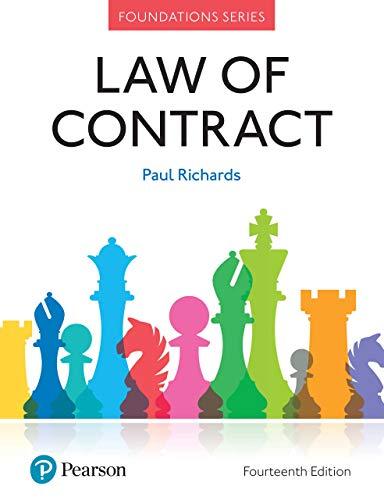Question
1. What is the difference between a crime and a civil wrong (or tort)? 2. In the following situations, which source of law takes priority,
1. What is the difference between a crime and a civil wrong (or tort)?
2. In the following situations, which source of law takes priority, and why?
a. The state statute conflicts with the common law of that state.
b. A federal statute conflicts with the US Constitution.
c.A common-law decision in one state conflicts with the US Constitution.
d.A federal statute conflicts with a state constitution.
3. How does the principle of stare decisis provide stability to our legal system?
4.Lindsey Paradise is not selected for her sorority of choice at the University of Kansas. She has spent all her time rushing that particular sorority, which chooses some of her friends but not her. She is disappointed and angry and wants to sue the sorority. What are her prospects of recovery in the legal system? Explain.
5. Case Analysis:
Karen Silkwood was an employee at the KerrMcGee Nuclear Power Plant in Oklahoma. During her employment there, she was apparently contaminated by exposure to plutonium. The contamination was so severe that she had to be sent to a special facility for an examination, and her personal belongings at her home had to be destroyed. After Silkwood died in an unrelated car accident, her father, as administrator of her estate, brought a lawsuit against the Kerr-McGee power plant. Under state tort law, Silkwood's estate was awarded actual damages of $505,000 ($500,000 for personal injuries, and $5,000 for property loss), and $10 million in punitive damages, that is, damages designed to punish the defendant for its wanton misbehavior. The power plant argued that when Congress passed the Atomic Energy Act, it intended to completely outlaw any state regulation of nuclear power plants. Permitting the plaintiff to receive punitive damages in this case would destroy that intent. Silkwood's father, as the plaintiff in the case, argued that there was no intent expressed by Congress to preempt tort law in the area of nuclear regulation. In fact, when the plaintiff searched the Congressional Record, he could find no evidence that Congress intended to replace state tort law by passing the Atomic Energy Act. He also found that whenever Congress passed statutes similar to the Atomic Energy Act, there was never any intention to replace state tort law. Therefore, the plaintiff concluded, Congress did not intend to preempt state tort law in this case either. Is the plaintiff correct? Explain.Silkwood v. Kerr-McGee Corporation,464 U.S. 238 (U.S. Supreme Court).
6.The role of the judge is to interpret the law, but not to make law. Do you agree with this statement? Why or why not?
Step by Step Solution
There are 3 Steps involved in it
Step: 1

Get Instant Access to Expert-Tailored Solutions
See step-by-step solutions with expert insights and AI powered tools for academic success
Step: 2

Step: 3

Ace Your Homework with AI
Get the answers you need in no time with our AI-driven, step-by-step assistance
Get Started


